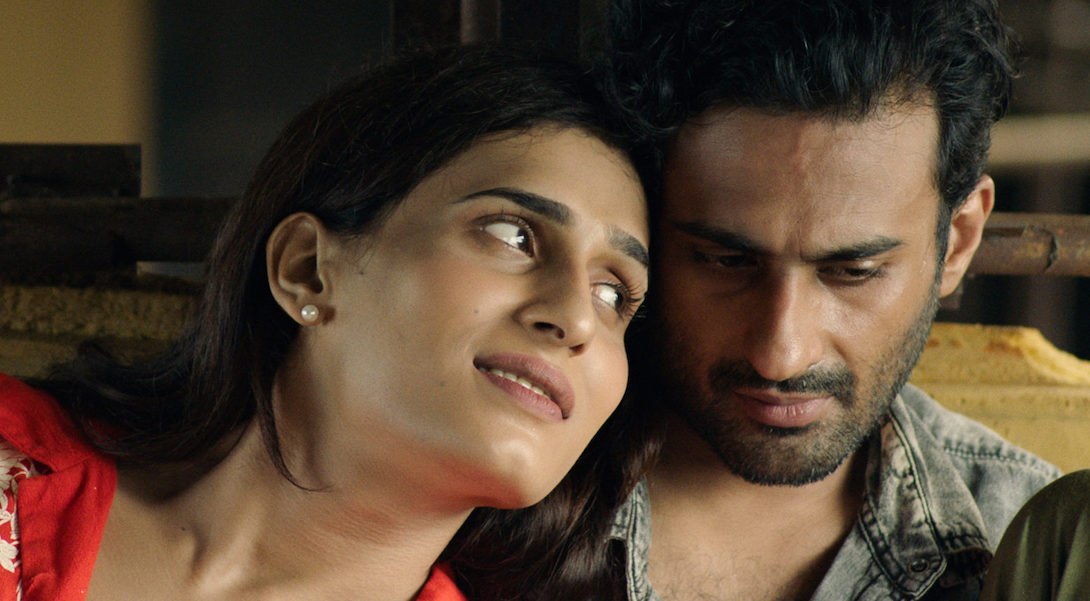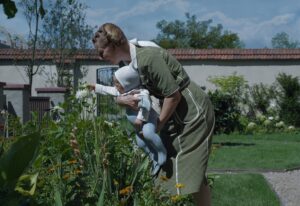
“Let’s go to Joyland,” says Nucchi to her sister-in-law Mumtaz. Joyland is an amusement park somewhere in Lahore. It has Ferris wheels, neon lights and a string of possible distractions that would help them escape their joyless life in the Rana household. Married to siblings, the women share an amiable equation despite not experiencing joy of any form in their oppressing patriarchal family.
Joyland is not a classic family drama. Instead, the system of family is intrinsic to its casualties. Plagued by rigid dogmas that society is unable to get over, the members of the unit quietly internalize their aches. Filmmaker Saim Sadiq’s protagonist is Haider (Ali Junejo), a prototype of young men that alpha elderly fathers aren’t proud of. Understandably enough, the family patriarch is ashamed to find his younger son acting timid to sacrifice a goat at the birth of a child in the household.
The real Haider, interestingly, is not one anybody has seen before. It is a version that the man hasn’t discovered himself until he meets Biba (Alina Khan) – a transgender dancer at an erotic dance theatre. Hired to be her backing dancer, the young man could hardly shake a leg. All he has are eyes for her mystique.
Haider and Biba turn closer with each passing day. The man’s robe goes off and so does his inhibition to sway along with music. Inevitably enough, he falls madly in love with her.
Love isn’t so complicated when it comes sans elements of taboo. Or in the absence of a rather understanding wife back home. Then again, Joyland isn’t a tale of fidelity. It is about identity. If Haider is discovering himself through Biba’s unfiltered, uncompromising life, Mumtaz is struggling hard to make peace with a changed status quo. Once an enthusiastic breadwinner, the woman is saddled in the four walls of her home. Reason? Her husband’s recent tryst with employment and, later, a pregnancy that everyone else is overjoyed about.
Gender is a construct that is profoundly discussed in Joyland. In a society that hails binary existences, Biba celebrates her life to the fullest. Envy might have been one of the many reasons that draw Haider to her in an instant. The first time he sees her, Biba is in a hospital with blood stains all over her clothes. A nurturing person by nature, perhaps he wanted to protect the strong woman with a vulnerable heart. Then again, Haider has issues to make sense of. The question is: Is it too late for him to confront himself?
For millions of queer individuals across the globe, being in the closet comes as naturally as breathing. They are perhaps waiting for a moment or a revelation that would change their respective consciences to a point of no return. Although a man as indecisive and domestic as Haider would never want his family to disown him, his temptation to let loose and breathe free in every sense is what gravitates him to Biba. The most entrancing sight from Joyland is one where Haider rides a bike, holding a life-size cutout of the woman he loves.
Gender is not always restricted to realms of sexuality, asserts Saim Sadiq. Formerly a stay-at-home husband, Haider is not proud enough to announce that he is a dancer at his workplace. He claims to be a ‘manager’ at the theatre even though his loving wife knows the truth and encourages him with a tiny tinge of jealousy. Another unexpected victim of standard genre paradigms is Aunty Fayyaz who is the Rana family’s next-door neighbour. On the very eventful night that Haider wins over Biba’s heart and the daughters-in-law of the household relish a fun time at Joyland, the elderly widow inadvertently causes shame to her son’s family. How can a woman of her age spend a night at the neighbours’? Somewhere approaching the sunset of her life, the woman perhaps seeks an outlet to spread what she can offer: a little care or an ounce of happiness.
Saim Sadiq does not render Joyland a spectacle. The camera which abounds in red (lensed by Joe Saade) consistently moves as it caresses its subjects to expose their minute vulnerabilities. The dialogues – even when they are high on decibel levels – do not intend to hammer his ideas. Joyland lets its individuals be themselves. Haider’s brother, for example, is a loving man with his definition of manhood. One day at the mosque, he hints to his little brother to man up – in every way. Sadiq’s screenplay does not judge the man for being a proponent of certain social conditioning. Likewise, when Nucchi recommends Mumtaz to wear more fitting outfits, we see it’s all coming from a good place – however faulty its background is.
Among other things, Joyland examines many sides of being a woman. Biba battles obvious discrimination due to her trans identity. With the prime slot at the theatre being allotted to a voluptuous cis-woman, Biba’s performances during the interval invite fewer eyeballs. If Mumtaz is at a personal and professional crossroads, Nucchi is unable to provide a male heir to the family while Aunty Fayyaz’s conduct is not dignified enough for anyone around. The women know that resistance is not a way to deal with their respective traumas. The early close-up shot of Nucchi’s disappointed face after delivering (yet another) baby girl pretty much sums up her outlet of sorrow. “I can stay here,” is the boldest statement Fayyaz would ever make to justify herself, only to be dismissed by the man of the house stating, “Haider will walk you home.”
Saim Sadiq’s film is a landmark fare in the history of queer cinema in the Indian subcontinent. Unlike the West, the cultural nitty-gritty of a nation such as Pakistan is near-impossible to blend in with the changing ways of gender, sexuality and identity. The writing, which masterfully crafts standout moments for all the lead actors, is the real winner in this honest, unassuming film about unhappy, under-loved people.
Ali Junejo is heartbreaking as he waltzes like a pro into Haider’s complex mindscape. The actor’s angelic face and inherent quietude add volumes to make the film what it is. Alina Khan’s alluring presence is felt in the frames even when she is absent. The actor is extraordinary in the scene where she breaks up with Haider. Rasti Farooq who essays the part of Mumtaz gets the most complex of parts in Joyland. It is heart-wrenching to watch the woman dissolve in a puddle of grief she somewhere saw coming.
The standout moment from Joyland – for me – must be the flashback scene which appears right before the finale. It’s a brief interaction between Haider and Mumtaz days before their marriage. Without vocalizing much, the duo expresses some of their deepest desires and fears. There is anxiety, tenderness and hope in their unpretentious eyes. If only the ways of the world were as simple as their innocent hearts – a world where nothing else thrives but sheer, limitless joy.
Rating: ★★★★ 1/2

